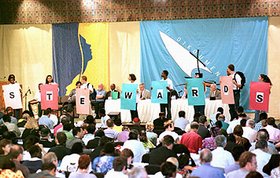Read the application form carefully, print it, fill it out clearly (type if
possible) and submit it by fax
or post to the address mentioned on the bottom of the form by the 12 April 2002 deadline.
The selection of 40 stewards will be based on the application form and only applications which are fully
completed and submitted on time will be considered. The number of places in the programme are limited,
so some people are
bound to be disappointed because there will not be enough places for all the well-qualified
applicants. However, all
applicants will be informed by May 2002.
The WCC will be responsible for board and lodging expenses during the time of the programme and will
provide some pocket
money. Travel costs to and from the meeting are to be borne by the steward, except in cases where
partial subsidy is
granted. Passport, visa and any other related personal expenses are the responsibility of the
steward.




